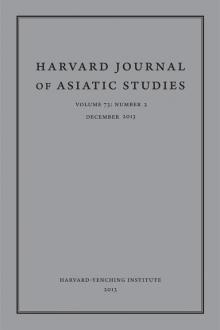December 2013
Articles
The Junghar Mongol Legacy and the Language of Loyalty in Qing Xinjiang
In light of recent scholarly interest in the Qing empire’s handling of ethnic and religious difference, David Brophy explores the place of Islam, and the Muslims of Xinjiang, within the Qing imperium. Qing multilingualism and ideological pluralism rarely extended to the language and faith of Xinjiang’s Muslims. Some scholars have seen this as evidence that the Qing sought, but ultimately failed, to treat the Muslims of Xinjiang as one of its constituencies. Through an analysis of translation practices, Brophy argues that the Qing had a view of Inner Asian Muslims that derived from the latter’s role as go-betweens in diplomatic and trade relations with the Junghar Mongols. As a result, Qing officials found among these Muslims collaborators who were capable of meeting the Qing empire on the common ground of Mongolian concepts of rulership; thus they felt no need to develop a distinctly Islamic justification for ruling in Xinjiang.
A Legacy of Success
Office Purchase and State-Elite Relations in Qing China
Revisiting the enduring debate on meritocracy in late imperial Chinese history, Lawrence Zhang examines the system of office purchase (juanna 捐納) and its effects on the composition and nature of Qing-dynasty officialdom. Through extensive quantitative analysis of the number of officials who purchased their way into the bureaucracy, and by weighing the costs and benefits of the juanna institution, Zhang argues that this institution was no less important than the civil service examinations in the recruitment of bureaucrats by the imperial center. Wealth was the key to unlocking this path of advancement and continued to play a role in the competition for success even among those who had already been certified as eligible for office. Those who purchased offices were given guarantees for appointments, an advantage that was afforded to no other group and opened up the possibility of hereditary office-holding among nationally prominent families.
Inscribing and Ascribing Merit
Buddhist Vows and the Hōryūji Shaka Triad
Akiko Walley reconsiders the long-debated question of the reliability of an inscription on the back of the mandorla of the seventh-century bronze Shaka triad at the Golden Hall of Hōryūji in Nara. First she analyzes the function of inscriptions on Buddhist statues in the seventh-century archipelago by focusing on precisely where they are placed. Although these inscriptions appeared on the surface of the statues, they were, she observes, typically positioned away from the gaze of general worshipers. Accordingly, Walley argues that the inscriptions were meant as private communications whose purpose was to reaffirm significant family connections that had been lost through death. Next Walley demonstrates that the Kashiwade family, which was named as the chief commissioner of the Shaka triad in its inscription, was in dire need of such affirmation; on the basis of this finding, she concludes that the inscription was likely placed at the moment of the statue’s origin.
